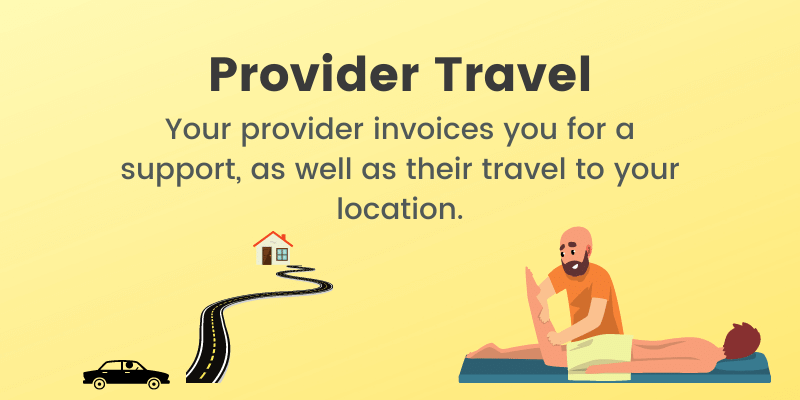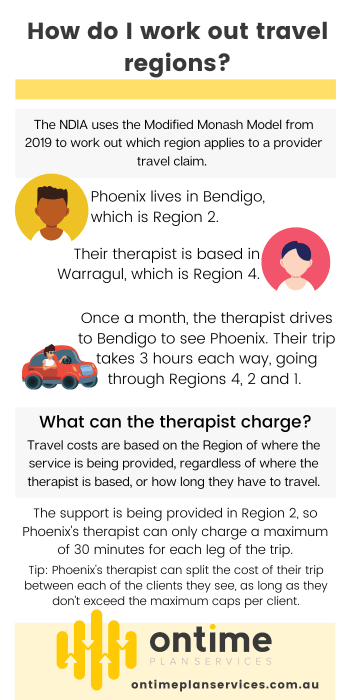The NDIS pays for different transport supports for participants and providers. Unfortunately, the words ‘travel’ and ‘transport’ can get confusing.
Part 1 discussed Transport and Travel for participants. Here in Part 2 we look at provider travel.
Before we go any further – the NDIS likes to change things up a lot. Always follow the links and check the NDIS website for the latest rules and prices. Now, read on!
Travel Explained

As a plan manager, our clients often ask us, “My provider has charged me for travel. Can they do that?”. The short answer is, “It depends”.
The NDIA sets out a lot of rules around who can charge for travel, and when. Usually, providers can only charge for travel if:
- the provided support is face to face,
- the support is approved for provider travel in the NDIS price guide,
- the provider has explained their service and its value to the participant, and
- the provider has explained their travel costs and the client has agreed to them. Ideally, this should be in the provider’s Service Agreement.
There’s a bit more to it than that and all details are available in the NDIS Guide. If you’re a provider reading this, we’ve also got a separate blog post just for you.
Provider Travel can be charged in two parts
Time costs
Providers can claim the time to travel to a client, up to a maximum of:
- 30 minutes for supports delivered in a metropolitan or regional centre (MMM 1-3) or
- 60 minutes for a regional area (MMM 4-5).
The region code is based on the Modified Monash Model (2019 version). You can look up your address at the Health Workforce Locator tool.
When the NDIS says ‘region’, they mean where the support is being delivered. This is usually where the participant lives, not where the provider comes from.
Providers may also be able to claim for ‘return travel’. Return travel is when a provider goes back to their ‘usual workplace’ after seeing a client.
Sometimes, a provider may travel to an area further away, and see several clients in the one trip. In this case, they can split the travel charges among the clients, as agreed to beforehand.
When providers charge for travel time:
- it can’t be more than time caps above (e.g. 30 mins each way).
- therapists can only charge half the hourly rate they charge for their service. If your therapist charges $100 per hour for the support, they can only charge $50 per hour for their travel time.
- non-therapy providers can charge an hourly travel rate that is the same (or less) than their service rate. A support worker charging $50 per hour for support, can only charge $50 per hour (or less) for travel time.
- it comes from the same budget as your support. Make sure to account for that when you’re working out how many hours of services you can afford.

Tip from a plan manager: Discuss travel charges with your providers beforehand so you know what to expect. Check their invoices to make sure they match what you expect to see. When we receive an invoice for travel time, we can only see what was charged. If you've agreed to 10 minutes but get billed for 30 minutes, your funding will get chewed up very quickly!
Non-labour (vehicle) costs

Providers can also bill for costs they incur to provide supports to you outside of their office. This could be at your home or in the community, and can include road tolls, parking fees, and car running costs. The NDIA says these can be charged at “a reasonable contribution” rate. The NDIA suggests 99 cents per km as reasonable, but there is no maximum amount. Most providers tend to charge $1 per km, but some will charge more (or rarely, less).
A provider can bill for travel if the Price Guide allows for it, but it’s optional. For example, while gardeners and cleaners can charge for provider travel, not all of them will. Providers are not allowed to charge someone more just because they have an NDIS plan. If they don’t charge a private client for travel, they shouldn’t be charging you.
Just to confuse you further
What we’ve discussed above covers most participants. As with all things NDIS however, it isn’t that simple! There are other scenarios that you might stumble across, such as:
-
one provider traveling to see several clients in an area. It’s up to the provider and participant to come to an agreement on how to split travel charges.
-
participants living in Remote (Region 6) or Very Remote (7) regions. Different rules apply in this case!
If you’ve got a question on these, it’s best to get in touch with us so we can help you in your specific circumstances. You can also find more information in the NDIS price guide.
To wrap it up
Most providers can charge for travel costs to provide their face-to-face service to you.
They must follow NDIS guidelines as to what they can charge.
You should agree to these fees beforehand.

